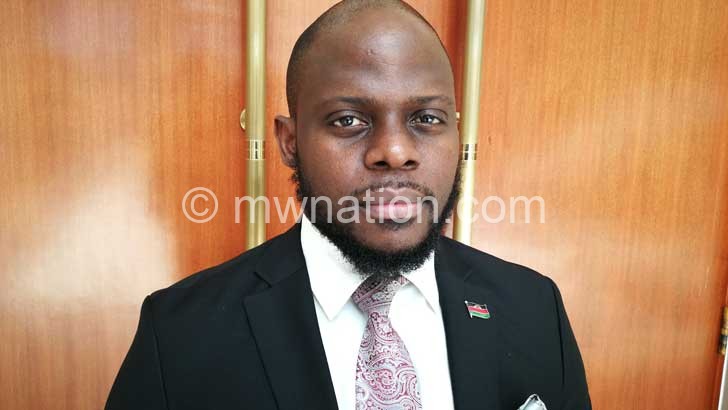DPP to account for discontinued cases
Director of Public Prosecutions (DPP) Masauko Chamkakala is expected to appear before the Parliamentary Legal Affairs Committee (LAC) next month to give reasons for discontinuing a number of cases.
According to Section 99(2e and 3) of the Constitution, the DPP has powers to discontinue any criminal proceedings at any stage before judgement and is required to give reasons to the committee within 10 days for purposes of accountability.

In an interview on Thursday, the committee’s chairperson Peter Dimba while confirming the scheduled meeting, indicated that the DPP will appear in the first-quarter of committee meetings, which will begin soon.
Said Dimba: “So, we have several discontinued cases that he has written to the committee on for both prominent and ordinary members of our society and as per procedure, he will appear before the committee in due course to account as he normally does.”
High-profile cases discontinued during the past 12 months include the K1.7 billion corruption case involving former president Bakili Muluzi. The DPP already presented a report to LAC on the Muluzi case and, also, gave an account for the discontinuance.
The other cases are the K16.5 billion tax-evasion case involving Mapeto David Whitehead and Sons (DWS) Limited executives and two Malawi Revenue Authority (MRA) customs officers, the State versus former vice-president Cassim Chilumpha and the State versus three directors of Paramount Holdings Limited.
But barely weeks after Chilumpha sued the government for unlawful arrest, government has filed an application to revive the case.
In the Paramount Holdings Limited case, the suspects were answering three charges related to government procurement deals.
The accused persons, namely Prakash Virgi Ghedia, Arvindkumar Atit Patel, Suresh Khimji Jagatiya and Paramount Holdings Limited were charged with conspiracy to commit a felony which is contrary to Section 404 of the Penal Code, making a false document that is contrary to Section 353 of the Penal Code and uttering a false document that is contrary to Section 360 of the Penal Code.
Dimba also pointed out that under his leadership, there has never been a situation where members disagreed with the DPP on the reasons for the discontinuance of a case.
He, however, added that the spirit of the law requires the committee to provide checks and balances so that he [DPP) doesn’t abuse his/her powers and avoid arbitrariness in decisions.
“So, hypothetically, where the committee is not convinced, it can tell the DPP to reconsider his decision and table a report in Parliament on the same,” he said.
The chairperson further explained that when a case is discontinued, the law provides for a period of 12 months within which the case can be resuscitated should it be found that the DPP erred in the decision.
The office of DPP has also freed some Cashgate suspects during the past two years after entering into plea-bargaining agreements with them to reimburse the stolen funds.
Those freed after paying back the money are Kettle Kamwangala, Fatch Chungano, Cecilia Ng’ambi, Sympathy Chisale and Ndaona Satema, according to official documents sourced from the Ministry of Justice.
Kamwangala was freed in May 2022 after paying back K16.7 million allegedly defrauded from government and she was answering two charges of theft, contrary to Section 278 of the Penal Code and money laundering contrary to Section 35 of the Money-Laundering Proceeds of Serious Crime and Terrorist Financing Act.
Chungano, Ng’ambi, Chisale and Satema were discharged from the K2.4 billion case involving former budget director Paul Mphwiyo and others in August 2022 after also paying back with interest a sum of K120 million.
MLS honorary secretary Chrispin Ngunde, in an earlier interview, pointed out that except for the lack of legal backing on the element of discontinuance, there is nothing wrong with plea-bargaining conducted within the parameters set by Section 252 A of the Criminal Procedure and Evidence Code (CP & EC).
Said Ngunde: “Whether or not to engage in plea-bargaining depends on the parties, [but] prosecution cannot be precluded from engaging in plea bargaining because previous similar cases were concluded without considering the option of engaging in a plea bargaining. [However] each case is treated based on its peculiar facts.”





